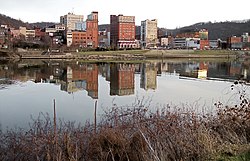References
- 1 2 3 4 White & Allen, ed. (1891). "Mayors". Laws and Ordinances for the Government of the City of Wheeling, West Virginia. Printed by the West Virginia Printing Company. Archived from the original on January 5, 2018.
- 1 2 3 4 5 6 7 8 9 10 J.H. Newton; G.G. Nichols; A.G. Sprankle (1879). "Wheeling: Past and Present". History of the Pan-handle: Being Historical Collections of the Counties of Ohio, Brooke, Marshall and Hancock, West Virginia. Wheeling: J.A. Caldwell. Archived from the original on January 5, 2018.
- 1 2 John J. Coniff, ed. (1901). "Mayors of the City of Wheeling". Laws and Ordinances for the Government of the City of Wheeling, West Virginia. Archived from the original on January 5, 2018 – via Google Books.
- ↑ J.B. Bowen (1839), "City Authorities of 1839", Wheeling Directory and Advertiser, Wheeling: John M. M'Creary, Printer, OCLC 3456530 – via Internet Archive
- 1 2 History of the Upper Ohio Valley, with Family History and Biographical Sketches. Madison, Wisconsin: Brant & Fuller. 1890.
- 1 2 3 Thomas Condit Miller; Hu Maxwell (1913). West Virginia and Its People. New York: Lewis Historical Publishing Company. Archived from the original on April 11, 2016. Retrieved August 25, 2017.
- 1 2 "Wheeling History: Wheeling Hall of Fame". Ohio County Public Library. Archived from the original on July 3, 2016. Retrieved June 30, 2016.
- 1 2 3 4 5 6 7 8 9 10 11 12 13 14 15 16 17 18 19 20 21 22 23 24 25 Charles A. Julian (2009), Wheeling Mayors (PDF), archived (PDF) from the original on April 7, 2017 – via wvgenweb.org (list)
- ↑ "Office of the Mayor". City of Wheeling. Archived from the original on April 7, 2003.
- ↑ "Office of the Mayor". City of Wheeling. Archived from the original on May 13, 2008.
- ↑ "Mayor of Wheeling". City of Wheeling, West Virginia. Archived from the original on May 19, 2016.
- ↑ "Mayor-Elect Glenn Elliott Leads Fresh Faces For Wheeling", The Intelligencer , Wheeling, WV, May 11, 2014, archived from the original on July 4, 2016
- ↑ "Mayor Contacts". City of Wheeling, WV. Retrieved July 8, 2024.
